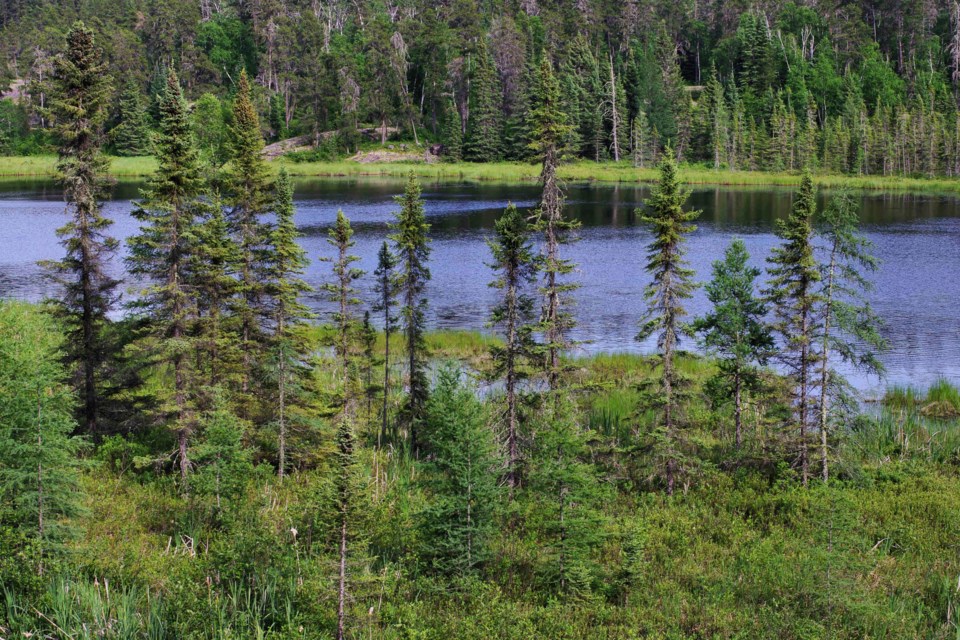THUNDER BAY — An American company that controls some large patches of forest northwest of Thunder Bay is considering the potential sale of its timberlands for use as a carbon offset initiative.
"I think it's very exciting that we could see a big carbon offset project in Northwestern Ontario," said Nancy Luckai, a registered professional forester and professor emerita in natural resources management at Lakehead University.
Wagner Forest Management – based in New Hampshire – owns 480,000 acres (195,000 hectares) of forest in eight former Abitibi-Consolidated freehold blocks located roughly between the Dog Lake area, Graham and Sioux Lookout.
It purchased the blocks from Abitibi in 2005 in a bidding process in which the Ontario government also participated.
Last July the company extended an invitation to investors interested in the potential development of its holdings as "one of the largest nature-based carbon removal projects in the Voluntary Carbon Market."
The announcement stated the project could generate "millions of emission reduction and removal credits, significantly contributing to climate change mitigation through sustainable forestry and land use practices."
In the voluntary carbon market, organizations can buy carbon credits to offset CO2 emissions and help combat climate change.
Wagner announced in a news release that it had retained a securities firm as a financial advisor, and that marketing materials were being prepared to describe the property and its carbon offset opportunity.
So far there's no word on the outcome of the marketing efforts.
Newswatch reached out to Wagner about its intentions and about the status of the project, but did not receive a response.
Luckai said there's controversy around the world over the effectiveness of some carbon offset projects but she feels "it is a really important alternative way for us to use our forest resources to address climate change."
She said these projects require more than just leaving a forest intact.
"It isn't simply left there to do what it's going to do. That would be considered business as usual, and you can't actually build a carbon offset on that...You actually have to show a feature called additionality. So there has to be some investment into the property to ensure that the rate of growth, the rate of carbon sequestration, is actually greater than what would happen under natural conditions."
Luckai explained that there would be options for additionality.
"Whether it's silviculture to enhance the rate of regeneration, or some kind of appropriate fertilization, perhaps the use of ash from the boilers at Thunder Bay Pulp & Paper, there are lots of opportunities. And because there's a good road system – it's not that far from Thunder Bay, you know – there's potential there do some neat things with respect to carbon sequestration."
She said Wagner's forest management practices are currently certified through the Sustainable Forestry Initiative, an independent non-profit organization.
"That is the most popular certification program in Canada. It's not a small thing to have achieved that. They would have had to show they've maintained the forested area in a sustainable fashion."
Luckai said the SFI was developed by the forest industry, but Natural Resources Canada recognizes its certification, and that Wagner's practices recently passed an audit by PricewaterhouseCoopers.
"It includes a whole set of criteria that speak to sustainable management. There are also criteria in there that speak to the public side of it, like stakeholder engagement, support for local initiatives, and so on."
Another Thunder Bay-based registered professional forester, Laird Van Damme, is very familiar with the Wagner properties and said "they're as good a site as any" for a carbon offset project.
"There are a lot of private timberlands across Canada like the freehold that were mostly managed for timber. A lot of them are in carbon programs now," he said, adding that the Wagner holdings would constitute the largest carbon removal project in Northern Ontario if it went ahead.
One existing project in the region is the Perimeter Forest near the southeastern shore of Lake Superior.
On its managed lands northwest of Thunder Bay, Wagner requires recreational users to purchase a permit for access to the former Abitibi blocks, as well as to the abandoned former CNR railbed between the Matawin River and Sioux Lookout which it acquired separately.
In some areas, access for recreation is prohibited.
But Van Damme noted "A lot of people thought that it used to be Crown land in their lifetime, and that Wagner then took it and restricted access. Well, that's not true. It's been private since the 1920s. Abitibi started restricting access...They issued passes for hunting and things like that."
The acquisition of the Abitibi Consolidated timberlands by the U.S. company for $55 million nearly 20 years ago did raise some questions about privately-held companies controlling forested areas.
At the time, Ontario Natural Resources Minister David Ramsay said he was concerned about fibre potentially being bought up by firms with no vested interest in providing jobs.
He said this was why the government itself decided to put in a bid, which ultimately failed.
Blocks 1 to 8 were originally granted to the Grand Trunk Pacific Railway in 1909, and were later acquired by Abitibi.
In an email to Newswatch, an MNR spokesperson said "privately-owned timberlands are subject to regulation of matters like safety, protection of species at risk and water crossings," but "The details of how the forests are managed are left to the landowner."
Wagner has a long-standing relationship with Lakehead University and the faculty of natural resources.
According to Luckai, "Wagner has certainly been a solid supporter...They do support some of our student-led initiatives, and there have been some research plots on their area. Certainly, students have gone there for field trips and that sort of thing...and I think quite a few of their employees are actually Lakehead grads."
